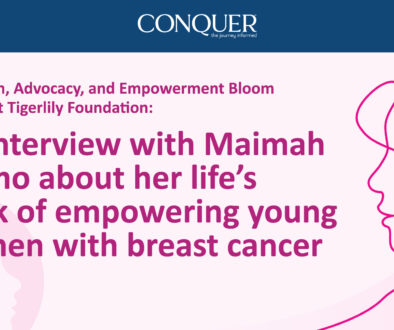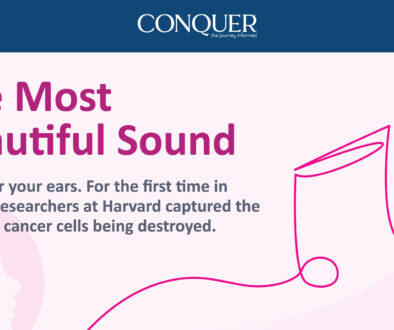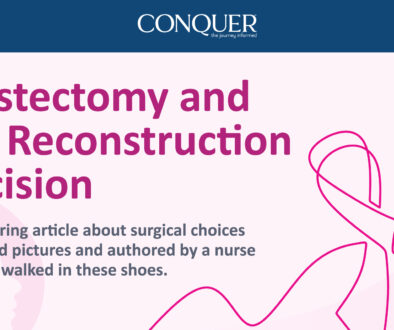Being Catapulted into a New Frontier: Moving from Challenge to Catalyst
This video has been brought to you by the #MyLifeIsMyLegacy Campaign
“My story with breast cancer can be seen as tragic. But instead, I want people to see it as hopeful and inspiring. I’m still a dynamic, loving 37 year-old woman. And at every moment since my diagnosis, I am still LIVING. Cancer is part of my life but it doesn’t define me.” -Julia Maues
Cancer is traumatic, painful, catastrophic, and life-altering. The trauma of breast cancer occurs not only from the cancer itself, but also from the treatment and from navigating the medical system. It can also be traumatic to witness suffering and experience the loss of others. Along the way, some experiences may heighten the trauma. Other experiences, like having community support, or a spiritual awakening, can strengthen us, give us a new perspective, and even motivate us to take action.
When you receive an initial diagnosis of cancer, you may experience a range of emotions, including shock, fear, grief, confusion, exhaustion, desperation, hopelessness, anger, rage, or doubt. When Nunny Keyla Reece first found out she has metastatic breast cancer (mBC), she woke up every morning wondering, “Am I going to die today . . . ?” She felt fear and often cried when she felt anything new happening with her body. She would think, “Is this it?” The unknown worsened her fear because she didn’t understand what was happening. She had anxiety attacks for the first time in her life.
Similarly, Jamil Rivers describes her first moments of mBC as being “catapulted into a whole new frontier of everything.” She felt afraid that she would not be able to see her sons grow up or grow old with her husband. Yet no state is permanent. Over time, what became most traumatic for Jamil was the loss of those with whom she developed close relationships. Of those she lost, Jamil explains, “They were diagnosed before me and they’re just as passionate. They tried to push through and they ran out of time. Now I have to keep that work going. I’m looking at my time that I have left and trying to make the most of it.”
Your feelings might also shift, day to day and over time. Sheila Marie McGlown explains that when she was diagnosed with mBC at 43, she saw her life in “fast forward; I thought about when I was born to up to the age of 43.” She thought, “Where did it go?” She struggled to accept the cancer until one one morning when she woke up and noticed her hair on the bed. In that moment, she experienced a radical shift. “I have no control over this,” she thought, and that was when she accepted the it. After learning of estimated survival rates, Sheila made a bucket list so that she could make every moment count. Then after year 5, she thought, “hhmm. I’m not dead yet.” And after year 6, she thought, “hhmm.” And a decade later, she thinks, ”I’M STILL HERE.”
Eventually, you might move from the initial shock to a place of acceptance where the unexpected can occur. Alongside the trauma of cancer, many develop what is called posttraumatic growth, which is personal development or “positive change” that results from “struggle with a major life crisis or a traumatic event.” This does not happen overnight; it’s gradual and happens in fits and starts. You may experience moments of this right now; it’s also okay to not feel this way at all.
If and when you experience posttraumatic growth, you may develop a sense that the struggle gives you newfound purpose or opportunities. You might experience a newfound closeness with others or connection to people who suffer from cancer or other traumas. You may develop an awareness of your own strength and “appreciation for life in general.” You may also develop a deepening of spiritual life and a shift in priorities (Posttraumatic Growth Research Group). As Nunny explains, “I didn’t want to live my life being scared, so I changed my whole life. I started deepening my spiritual relationship with God and without that, it would have been so hard for me.”
Julia Maues was diagnosed with breast cancer in 2013, while pregnant. “To my surprise,” she says, “chemo during pregnancy is the standard of care. I delivered a healthy baby boy with a head full of hair while I had no hair at all.” After her son was born, Julia did tests she could not do while pregnant, and learned that the cancer had spread to her brain, liver, and bones. After trying different drugs and finding the right one, the cancer started to respond to the therapy. Julia continues to experience many setbacks. As she explains, “Most drugs don’t penetrate the brain, many drugs harm the heart, the side effects can be debilitating, and my illness has taken a huge emotional toll on me and my loved ones.” But she still expresses the most authentic parts of herself: “I’m still a dynamic, loving 375-year-old woman. And at every moment since my diagnosis, I am still LIVING. Cancer is part of my life but it doesn’t define me.”
Julia’s experience also opened her eyes to inequities in breast cancer research and treatment. “Did you know that the share of the money obtained in pink campaigns that goes to research on metastatic breast cancer is negligible compared to where the rest of the money goes? Or that breast cancer mortality is 40 percent higher for Black women? Metastatic breast cancer is the only breast cancer that kills and research is the only effort that truly helps patients do what we want to do – LIVE! That is not pink!”
Since developing this awareness, Julia has become involved in advocacy, which has been rewarding. She says that she enjoys connecting with researchers and “showing them the side of breast cancer they often can only imagine – the life of a patient.” After recently collaborating with a researcher, he told her, “‘Regardless of whether we meet again, I want you to know I have been moved by your profound fighting spirit and it is making me redouble my efforts within my research.’” During her lifetime, Julia’s goal, like that of so many advocates with mBC, is “to make an impact in the lives of others dealing with this disease.”



